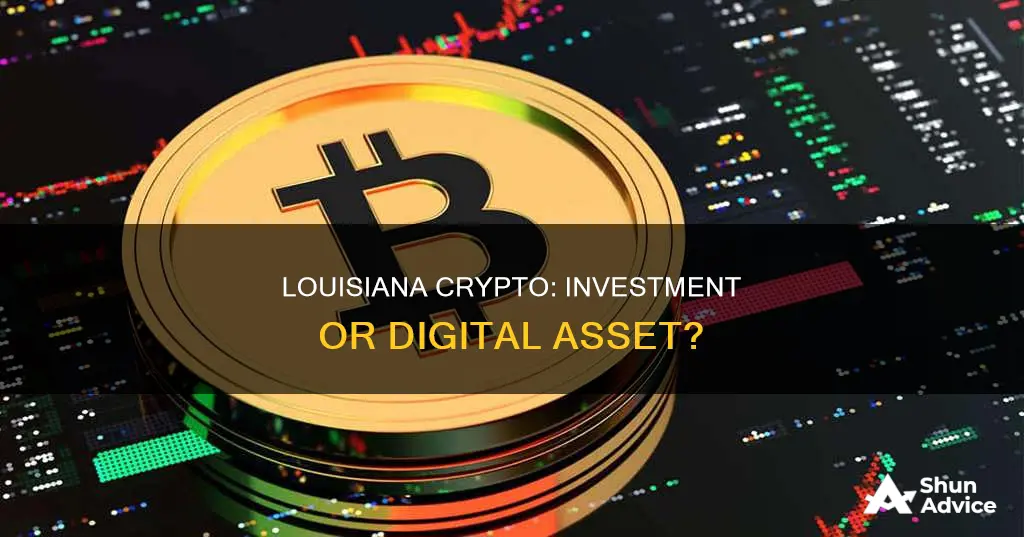
Louisiana is home to several businesses and organizations that use crypto and blockchain in innovative ways, and the state has a growing crypto community. The state has implemented the Virtual Currency Businesses Act (VCBA) to regulate and license crypto businesses, and it has been working to make it easier for its residents to buy crypto, for example, by using a crypto ATM. However, the legal status of cryptocurrencies is still evolving, and there are potential legal risks for investors. For example, the IRS has defined cryptocurrencies as property, which means that individual investors are subject to capital gains tax laws when reporting cryptocurrency profits and expenses on their annual tax returns.
| Characteristics | Values |
|---|---|
| Crypto considered investment holdings | Yes |
| Louisiana's stance on crypto | Louisiana has implemented the Virtual Currency Businesses Act (VCBA) to oversee virtual currency activities within the state. The state also has crypto-friendly policies such as allowing banks to hold custody of their customers' cryptocurrency and having low electricity costs, making it an attractive place for crypto mining. |
| Crypto businesses regulation | Crypto businesses in Louisiana are required to secure a license from the state's Office of Financial Institutions (OFI) and comply with other requirements such as submitting executives' fingerprints and paying a non-refundable registration fee. |
| Crypto taxes | Cryptocurrency profits are taxable as capital gains in the U.S. |
| Crypto foreign bank account reporting | As of August 2023, federal law does not require reporting of foreign cryptocurrency accounts. However, this could change as FinCEN intends to propose amending the filing requirements to include cryptocurrency holdings. |
What You'll Learn

Louisiana's regulatory framework for crypto
Louisiana has been making moves to establish a regulatory framework for cryptocurrencies. In 2020, the state's House of Representatives passed a bill to regulate and license virtual currency businesses. The bill, sponsored by state representative Mark Wright, sought to establish a process for companies dealing with cryptocurrencies to obtain licenses. It also aimed to provide definitional language for crypto exchanges and "virtual currency". The bill was then moved to the state's Senate for evaluation.
In June 2024, Louisiana's governor Jeff Landry signed HB 488, which encouraged Bitcoin mining and prohibited central bank digital currencies (CBDCs). This bill received bipartisan support for championing states' rights in crypto policy.
Louisiana is also home to several homegrown businesses and organizations that utilize cryptocurrencies and blockchain technology. The state has a relatively low cost of electricity, making it an attractive location for Bitcoin mining operations. Additionally, the governor of Louisiana signed a bill allowing banks in the state to hold custody of their customers' cryptocurrency.
The Louisiana Office of Financial Institutions has also issued guidance for cryptocurrency consumers and investors, stating that "virtual currencies have legitimate purposes and can be purchased, sold, and exchanged with other types of virtual currencies or real currencies like the U.S. dollar." This indicates that the state sanctions the use of cryptocurrencies.
While Louisiana may not be known as a leader in the crypto industry, it has a growing crypto scene and is taking steps towards establishing a clear regulatory framework for virtual currencies.
Bitcoin Investment Bots: How Long Do They Last?
You may want to see also

Crypto as a taxable asset
Crypto assets are considered taxable by the Internal Revenue Service (IRS) in the US. The IRS treats cryptocurrencies as property for tax purposes, which means that any profits or income from your cryptocurrency is taxable. If you hold a cryptocurrency, sell it, and profit, you owe capital gains tax on that profit, similar to a share of stock. The tax rate depends on the duration for which the asset was held, with higher rates for shorter holding periods.
If you use cryptocurrency to buy goods or services, you owe taxes on the increased value between the price you paid for the crypto and its value at the time you spent it, plus any other taxes you might trigger. If you are a cryptocurrency miner, the value of your crypto at the time it was mined counts as income.
Crypto assets can be used in many different ways, and this is where it gets a bit more complicated. For example, crypto assets can be used to pay for products and services, traded for other cryptocurrencies, or to pay or receive payment for non-fungible tokens (NFTs). In the eyes of the IRS, any time crypto is used as a medium of exchange, it becomes taxable. Precisely how it is taxed depends on the nature of the transaction and the value of the taxpayer’s capital gains or losses.
For example, if someone pays for a good or service with crypto and profits from the difference in price, then the profit is reported as ordinary income. Mined crypto earnings are also taxed as income. However, if one sells or trades crypto, any profits are taxed as capital gains, just as if they were selling a stock.
Cryptos also have their own version of a stock split, called a “fork,” which can be either a hard fork or a soft fork. A soft fork typically has neutral tax consequences, as the overall value of an investor’s assets after the fork remains the same. On the other hand, a hard fork creates an entirely new cryptocurrency, and its value appreciates or depreciates separately from the original crypto. As long as the overall value of an investor’s assets remains the same, there are no tax consequences. However, if new tokens from a hard fork are given to investors as a gift or "airdrop," the value of these additional assets is taxable as a capital gain.
NFTs are another type of digital asset that may be subject to taxation. For most NFT transactions, taxation is straightforward, with any profits from the sale or trade of an NFT subject to capital gains tax. If crypto is used to purchase an NFT, the buyer is essentially cashing out their crypto, and the transaction is taxed accordingly.
Crypto Investing: Navigating Legal and Illegal Territories
You may want to see also

Crypto and foreign bank account regulations
Louisiana is home to several businesses and organisations that use crypto and blockchain in innovative ways. However, it is not considered a leader in the crypto industry. The state has a low number of crypto companies, but those that do exist showcase the business acumen of its residents. Crypto enthusiasts in the state are also advocating for crypto-friendly policies, which could make a big difference in driving mainstream adoption.
In 2023, the governor of Louisiana signed a bill allowing banks in the state to hold their customers' cryptocurrency. This is significant because not all banks are crypto-friendly. The state also has a low cost of electricity, making it an attractive location for crypto mining.
In terms of regulations, the IRS has defined cryptocurrencies as property, and taxes are paid on capital gains. There is some uncertainty about whether additional reporting measures are required for investors who buy cryptocurrencies on foreign exchanges. Some tax professionals believe that there is an FBAR requirement, but others are unsure as there has been a lack of guidance from the government.
The Report of Foreign Bank and Financial Accounts (FBAR) is a form that must be filed annually by anyone with more than $10,000 in a foreign account. Another law, the Foreign Account Tax Compliance Act (FATCA), requires certain taxpayers to describe their overseas accounts on Form 8938 when filing taxes.
Virtual currency held in a foreign financial account with no other currency is generally not reportable. However, if there is any other currency in the account, it may become reportable. There is also a possibility that the regulations will change, as the IRS has indicated its intention to propose amending the regulations to include virtual currency as a type of reportable account.
To summarise, while Louisiana may not be a leader in the crypto industry, it has a number of crypto businesses and organisations, and the state has taken steps to make it a crypto-friendly location. In terms of regulations, there is some uncertainty about reporting requirements for crypto holdings, particularly for those who buy on foreign exchanges. However, to avoid penalties, it is generally recommended to err on the side of caution and report all cryptocurrency accounts.
A Beginner's Guide to Investing in Siacoin
You may want to see also

Crypto's legal status
Louisiana has implemented the Virtual Currency Businesses Act (VCBA) to oversee virtual currency activities within the state. As of July 1, 2023, all businesses involved in "virtual currency business activity" are required to secure a license, including those already holding money transmitter licenses. The Louisiana State House of Representatives passed a bill to regulate and license virtual currency businesses, which is now being evaluated by the Senate committee.
The bill, if passed, would establish Louisiana's first crypto licensing regime. Crypto businesses would have to apply with the state's Office of Financial Institutions (OFI), submit to background checks, and pay a non-refundable registration fee, among other requirements.
Louisiana is also home to several businesses and organizations that use crypto and blockchain technology in innovative ways. For example, Moxey, a community of small business owners in Baton Rouge, uses its own cryptocurrency to facilitate transactions among its members.
While the legal status of cryptocurrencies remains somewhat unclear, they are considered a form of money and are taxable as property in the US. As such, investors assume certain legal risks when buying and selling cryptocurrencies.
Magic Coin: A Worthy Investment?
You may want to see also

Crypto as a speculative investment
Louisiana is not known as a crypto industry leader, but it does have several businesses and organisations that use crypto and blockchain in innovative ways. One example is Moxey, a community of small business owners who use their own cryptocurrency to do business together and purchase goods and services. Moxey is based in Baton Rouge and is Louisiana's only cryptocurrency.
Another example is Business Blockchain HQ, a media website headquartered in New Orleans that provides high-quality content and research on blockchain applications for business and IT professionals.
The state also has a number of cryptocurrency ATMs, which make it easy for people to buy crypto on the go.
While crypto is not considered legal tender, it can be seen as a speculative investment. The value of cryptocurrencies like Bitcoin is highly volatile, driven by supply and demand rather than intrinsic value. This makes them a risky but potentially lucrative investment. For example, the price of a single bitcoin ranged from $1,000 in early 2017 to more than $63,000 in April 2021 before plunging to $34,000 in late May.
As with any speculative investment, there are risks associated with investing in cryptocurrencies. These include volatility, fraud, and the lack of recoverability if login credentials are lost or stolen.
Whether investing in cryptocurrencies is right for you depends on your financial goals and risk tolerance. It is important to remember that what goes up can also come down, and you should never invest more than you can afford to lose.
Coins: A Smart Investment Move?
You may want to see also
Frequently asked questions
Yes, crypto is considered an investment in Louisiana. In fact, Louisiana has implemented the Virtual Currency Businesses Act (VCBA) to oversee virtual currency activities within the state. Crypto is also considered a form of property in the US, and profits from trading are taxable as capital gains.
The risks of investing in crypto include user risk, regulatory risk, counterparty risk, management risk, programming risk, and market manipulation. User risk refers to the inability to reverse or cancel a transaction after it has been sent. Regulatory risk refers to the possibility of a sudden regulatory crackdown, which could make it challenging to sell cryptocurrencies. Counterparty risk refers to the potential loss of investment due to theft or failure of third-party custodians, such as exchanges. Management risk refers to the lack of protections against deceptive or unethical management practices. Programming risk refers to the possibility of bugs or exploits in smart contract code, which could result in loss of investment. Finally, market manipulation remains a substantial problem in the cryptocurrency market, with influential people, organizations, and exchanges acting unethically.
There are several ways to buy crypto in Louisiana. One option is to use a cryptocurrency exchange, such as Uphold, Gemini, or Coinbase. These platforms allow you to buy or sell cryptocurrencies at the current market price. Another option is to use a peer-to-peer exchange, such as LocalBitcoins. Additionally, crypto can be purchased through brokerage platforms or crypto ATMs.







